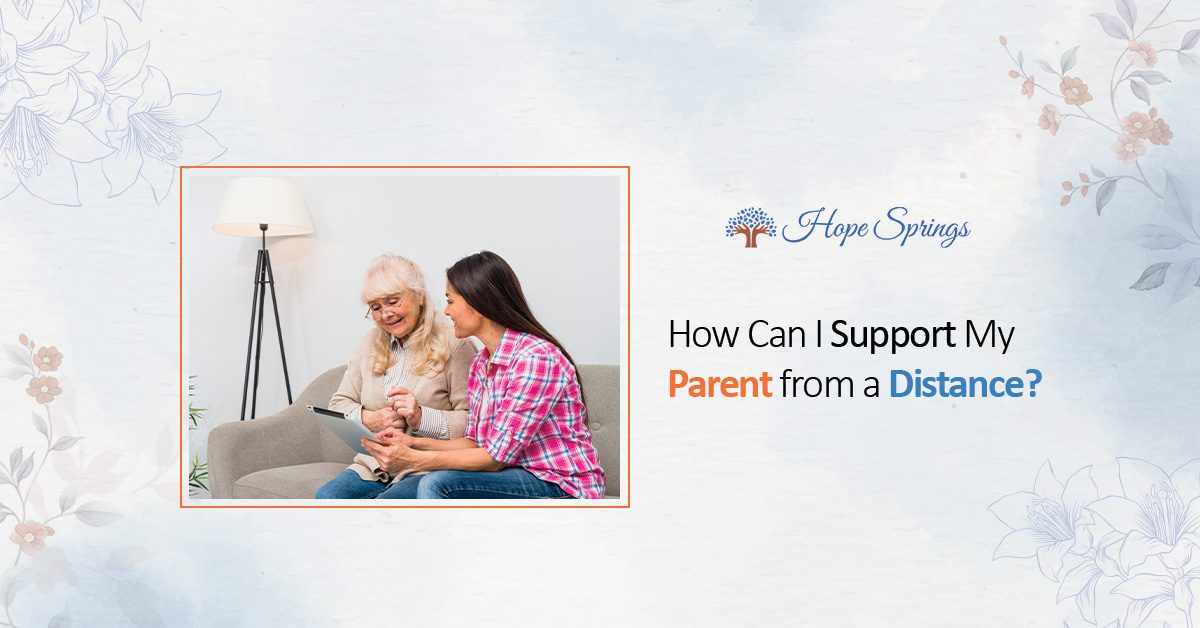Caring for a parent who lives far away can feel hard. You might miss small things. You might worry. That is okay. You can still help a lot. This guide gives simple steps you can use right now.
Why Distance Feels Hard
When you live far away, you may not see little changes. You may not know who to call. You may feel alone or restless. Feeling this way is normal. Small, steady actions help.
Start With a Short Plan
Make a short plan you can use each week. Write down:
- Who to call in an emergency.
- Your parent’s doctor name and phone number.
- Where the papers are kept.
- A list of medicines and when they are taken.
Keep the plan where you both can see it. A paper copy and a digital copy are good.
Talk Often and Make It Easy
Pick a day for a call or a video chat. Keep the calls short and warm. Ask simple questions like:
- How did you sleep?
- Did you take your pills?
- Do you need any help this week?
Use apps that are easy to open. One-touch calls work best. A quick chat can make your parent feel loved.
Use Technology That Helps
Try these tools:
- A video app with one-touch calls.
- A pill box with days on it.
- A medical alert device, if they need one.
Show your parent how to use each item. Write short steps and tape them to the fridge.
Help With Health Tasks
You can still help from far away:
- Call the doctor and set a visit.
- Order medicine refills online.
- Send groceries or a meal delivery.
- Find local home care if needed.
If your parent has memory loss or a long illness, plan more help now.
Take Care of Paperwork
Keep a list of important papers:
- Insurance cards.
- Power of attorney papers.
- A copy of the will.
- Doctor letters and test results.
Ask your parent if they want you to help with bills. Talk about money with care and respect.
Watch for Feelings
Being far away can make your parent feel lonely or scared. You can help by:
- Listening without trying to fix everything.
- Saying you love them and you are there.
- Sending small things like a song, a photo, or a short story.
If they feel very sad or worried, that is important. Mood changes matter.
Ask for Local Support
Find people near your parent who can check in:
- Friends or neighbors.
- A neighbor who can pick up the mail.
- Nearby family members.
List local services like meal delivery and rides. Don’t do it all alone.
When to Bring in a Therapist
Sometimes your parent needs someone to talk with. A therapist can help with grief, worry, sickness, or big life changes. Therapy can help the whole family talk and find answers.
Hope Springs Psychotherapy offers help for families and elders. They meet adults, couples, teens, and older adults. Their elder care therapy focuses on the needs of older people and their families. They understand how culture, family ties, and life changes shape how people feel.
Hope Springs can help like this:
- Teach ways to talk so both people feel heard.
- Help plan how to manage care from far away.
- Offer support when there is a loss or a serious illness.
- Work with families on hard talks about roles and money.
The practice is in New York City. Their team is led by Ladi Agahiu. They meet people with respect and care. If you need help making family plans or managing strong feelings, a therapist can guide you.
How to Talk About Tough Topics
Tough talks can be hard. Start with a gentle line:
- Say what you saw and ask a question: I noticed you missed your pills. Is there a reason?
- Offer choices, not orders: Would you like me to call your doctor or find a helper?
- Stay calm. Small steps work better than big changes.
Keep your parents’ voice in the plan. Ask what they want and help make a plan that fits them.
Take Care of Yourself
Helping from far away can wear you out. You need rest and time to breathe. Find someone you can talk with. A short walk, a friend, or a few quiet minutes can help. If you feel stuck, a therapist can help you sort your thoughts.
Small Acts Add Up
A meal sent, a call made, a bill paid, or a neighbor asked to visit. These small acts build a safety net. Do one small thing this week. Do another next week. Over time, those small acts add up to real care.
Conclusion
You can help your parent from a distance with simple steps and steady care. Use calls, plans, local help, and honest talks. If feelings are heavy, get help from a trained therapist. Hope Springs Psychotherapy can be a partner for families and older adults. They help you find the words and the plans that keep your parent safe and seen.
References:
- National Institute of Mental Health (NIMH). Depression: Overview and Symptoms.
- American Psychiatric Association. What Is Depression?
FAQs
Q. How can I help my parent from far away?
Call them often. Make a short plan with phone numbers and medicines. Ask a neighbor to check on them.
Q. How often should I call?
Try one short call each week. Call more if you are worried.




